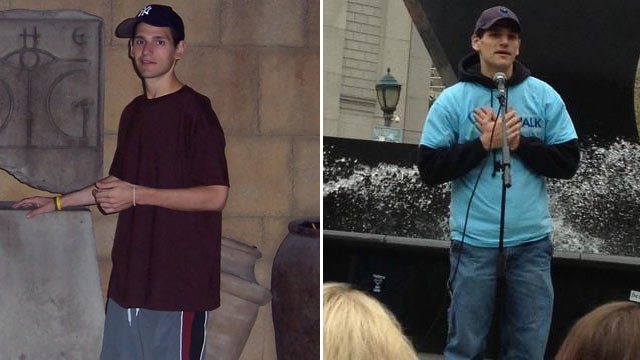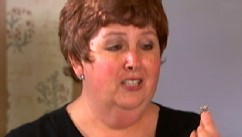Men With Eating Disorders Have Tougher Time Getting Help
When Victor Avon went home from his psychiatrist’s office the day he was diagnosed with anorexia, the first thing he did was look it up in a textbook from his college psychology course.
Of the four bullet-pointed criteria listed under the eating disorder, there was one that Avon couldn’t get past: He had to have missed his period three months in a row.
“I read it, and it destroyed me,” Avon said. “I can’t get my period. Never had it before, and it’ll be a miracle if I do get it. Right here in this book, this says I have a girls’ disease and that I’m broken.”
Of the estimated 30 million people in the United States with eating disorders, about 10 million of them are men, according to the National Eating Disorders Association. However, the first symptom of anorexia listed on the American Psychiatric Association’s website is “menstrual periods cease.” Many residential treatment facilities don’t accept men, and the male diagnosis isn’t always on doctors’ radars.
Related: Eating Disorders: Where to Get Help
One of the big problems for men with anorexia is that they don’t always have the skeletal look associated with anorexia in women, so it takes longer for loved ones to realize there’s a problem and get help, said psychiatrist Cynthia Bulik, who directs the University of North Carolina Center of Excellence for Eating Disorders.
“Our diagnosis was built around female cases, with the menstruation question being the best example,” said Bulik, who recently wrote a bookabout eating disorders in middle age.
Avon, now 30, was overweight from childhood through his sophomore year of college, and he usually leaned on food for comfort when he felt sad, which only made the problem worse. When he was in school he says he was bullied about his weight, and felt a sense of isolation because he wasn’t the man he felt he should be. When he was near 300 pounds, he says, he remembers staring around the dining hall and deciding to take control of his weight.
“I immediately declared war on my body,” he said. “Up until that moment, I’d taken everything bad that had ever happened to me and lined it up like a domino … I tipped the first one over. They fell for six years.”
Avon said he came to hate food because he blamed it for the bullying and his lack of perfection, so he dieted and exercised to the extreme. Since he had been overweight and was trying to “get healthy,” people encouraged him, making it easy to hide the disorder, he said.
By the next fall Avon had lost the “weight of a human being,” though he can’t remember how much it was, he said. His classmates had two reactions: “Vic, you look great,” and “Vic, you have cancer.” He ignored the latter.
Related: Anorexia Patients Overestimate Their Own Sizes
When Avon reached a healthy weight, he said he had to keep going.
He remembers being terrified of eating a Dum Dums lollipop because he feared it would make him gain the weight back overnight. If his shirt touched his stomach a certain way, it would remind him of his old body and bring back all the emotions associated with it.
Avon said standing made him dizzy and he sometimes slurred his words because he was so weak from starving himself.
Soon, he started pushing people away, and found himself going to bed and wishing that he wouldn’t wake up the next day, he said. He knew he had a problem, but didn’t know how to get better — or even if he wanted to get better.
“If I was a girl in that situation, they would have thrown me in a padded cell so quickly,” Avon said.
He finally sought a diagnosis in 2006 and learned he was anorexic. After he read about the missed menstrual periods, Internet research led him to more articles written for women, but nothing for someone like him. The one book he found was by a pro-anorexic man who died on the last page, which only triggered Avon to diet more.
Two years later, he decided to rid himself of his eating disorder for real, so he decided to spend several months as a patient in a facility for people with eating disorders.
“The day I told my family I wanted to go somewhere, it was a very liberating day, but it was also a day of panic because I didn’t know where I would have to go,” Avon said, adding that he didn’t want to be separated from his wife during treatment.
Many facilities only accept women. If Avon hadn’t found the Center for Eating Disorders Care at University Medical Center of Princeton, an hour from his home in New Jersey, he would have had to travel to Colorado, Utah or Nevada to find a place that accepted him.
“The problem with men is that there’s such a lack of treatment options for them, it ends up making people sicker,” he said. “Most of the focus goes over to the girls, which I understand, but a lot of places turn their eyes away from the male problem and focus on the girls.”







